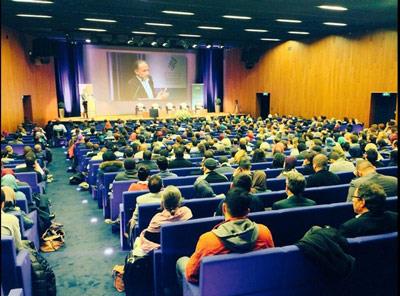Int'l Conference on Islamic Ethics Held in Brussels

"We are paying the price of a certain restrictive conception that says Islam is only Fiqh," Dr. Tariq Ramadan, the director of the Research Center for Islamic Legislation and Ethics (CILE) told attendants.
In his speech titled “Global Ethics and Applied Ethics”, Dr Ramadan presented an overview of three main sources of Islamic ethics which are law (fiqh), philosophy-theology and Sufism, in a bid to help audience understand how ethical values and principles are produced from within.
Dr. Ramadan also urged Muslims to go deeper in understanding the objectives of Islam, and not just stop at the level of Fiqh.
He was speaking at the inauguration of the third Annual International Conference on Islam & Contemporary Ethical Dilemmas held in Brussels.
He gave examples from the rich Islamic heritage of early Muslim scholars like Al-Ghazali, Averroes and other leading intellectual Muslim scholars who were pioneers in these fields.
The Conference was organized by CILE in cooperation this year with the European Muslim Network (EMN), and is attended by leading researchers and academics from Belgium and a number of European and other countries around the world.
It has also drawn a large Muslim audience from Brussels, who stood in long queues as all conference tickets were sold out.
This year’s conference focused on four main areas: Islam & Science, Economics & Finance, Islamic Discourse and Gender Issues.
At the end of his speech, Dr. Ramadan emphasized that the higher objective for a Muslim is to reach the state of peace, in order to become an agent of peace in society and for fellow human beings.
He added that the Prophet, peace be upon him, was described in the Qur’an as being a mercy to the worlds. He also urged Muslims to engage in a critical dialogue in order to be able to regain their leading intellectual and scientific position in today’s world.
Panels on Science & Economics
The first panel of the day discussed the topic of “Islam, Science and Evolution”, to debate the concrete example of the challenge of Evolutionism for Muslims.
Four experts on the topic, including Dr. Muzaffar Iqbal from Canada and Dr. Damian Howard from the UK, exchanged their views on the Theory of Evolution and how it relates to faith, including the Muslim and Catholic faiths, which was followed by a heated dialogue with the audience.
The second main panel in the afternoon focused on ethics in Economics and Finance.
Dr. David Vines from the UK gave the second keynote speech of the day which was titled “Restoring Trust in the Financial Services Industry” where he talked about ethical problems which were partly responsible for the global financial crisis of 2007.
This was followed by a panel on Economics and Finance, where Dr. Vines joined leading Muslim experts in Islamic Finance in a discussion on the main ethical issues facing humanity
Another discussion on economy included the real meaning of riba (usury) in Islam and the issue of Islamic finance and the Islamic economic model.
The Conference concluded on Sunday, with two more keynote speakers, including Dr. Karen Armstrong from the UK, and two panels on Islamic Discourse and Gender Issues.
The Research Center for Islamic Legislation and Ethics (CILE) was inaugurated in Doha, Qatar in January 2012, a project of Qatar Foundation.
The first two annual CILE international conferences were held in 2013 & 2014 in Doha, Qatar, while this year’s conference is the first to be held in Europe.
Soruce: On Islam



